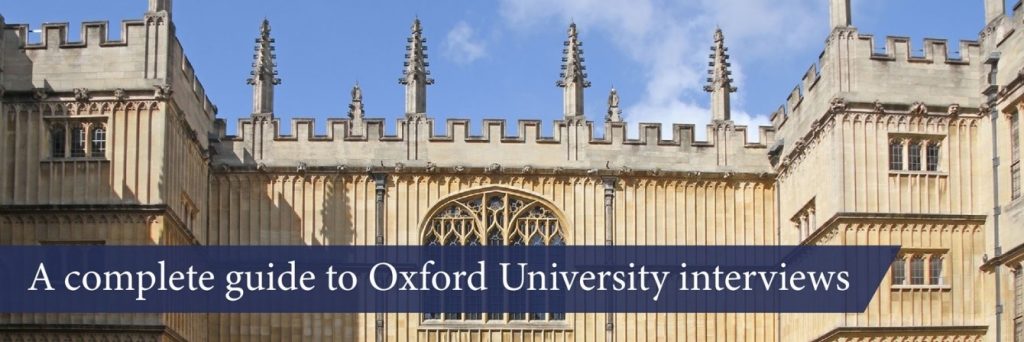Interviews are often considered to be the most intimidating and mysterious elements of the Oxford admissions process. This guide is designed to demystify the Oxford interview process so that you can approach your interview as confidently as possible.

What Role do the Oxford Interviews Play?
Interviews are one piece in the jigsaw of Oxford admissions. They are important, but as part of an overall picture. The other pieces of information colleges use include:
- The information contained in your UCAS form;
- Submitted work;
- Subject/Aptitude test scores.
How do I prepare for an interview at Oxford University?
There are many myths about Oxford interviews, particularly about the potential for unexpected (and sometimes unusual) questions. These myths might lead you to conclude that it is impossible to prepare for an interview. There are however a number of things that you can do to enable you to perform to your maximum potential in an interview.
You should try not to be scared of or overwhelmed by an Oxford interview. Such feelings will not have a positive impact on your performance. The Oxford interview is, contrary to one of the myths, not designed to be an especially unpleasant, terrifying or confrontational experience.
You should therefore try and understand what the purpose of the Oxford interview is: this is the foundation to ‘preparing’ for an interview.
The interview is an opportunity for your potential tutors to evaluate, through an assessment of your intellectual skills, your academic potential for study in the tutorial or small classes system. This system dominates the teaching and learning at Oxford. As one Oxford tutor has put it, on Oxford’s own website, ‘Interviews give us the chance to see whether an applicant has the intellectual capacity to learn and be stretched by our teaching system; fundamentally the question is this: can we teach this person in a tutorial situation and will they thrive in this environment?’
In order to familiarise yourself with tutorial-style teaching – and thereby with the potential format of an Oxford interview – you can do a number of things by way of preparation and practice: you can practise thinking logically, clearly and precisely and you can practise (with school teachers, friends and family) talking about the unknown and fielding answers to unexpected questions. You can engage with ideas and debate through reading, listening to podcasts and watching online lectures and you can ensure you are fully prepared for any questions on your interests by practising talking about everything referenced on your personal statement. You can also, where possible, try to arrange a mock interview, so that you can get feedback and have some exposure to how the real thing might actually feel.
Contact Keystone if you’d like to arrange a mock interview or want help preparing for your Oxford admissions test.
How many Oxford applicants get interviews?
Typically 20,000 applicants apply to Oxford each year for 3,300 places. Oxford interviews approximately 10,000 of these candidates.
How do you answer Oxford interview questions?
The primary purpose of Oxford interviews is to find out how you think. There will therefore often be multiple ways to answer a question. Answers to interview questions are an opportunity to demonstrate how effectively you can use logic and reason. You should try to answer questions with clarity and with precision. In order to do this make sure that you pause to digest the question and think about how you will answer it before you give your answer. (What may seem like a long and awkward silence to you will in all likelihood not actually be all that long or awkward). Structure your answer clearly – for example in a History interview you might make a point, develop it and then evidence it in the same way that you would in an essay – drawing out meaning from examples and linking them back to the question asked. Ensure that you have developed your answer fully, and in as precise a way as possible, and try to deal with as many of the questions that you anticipate tutors might ask afterwards, about your ideas, in your initial answer.
As they do in tutorials with undergraduates, at interview tutors may suggest different interpretations or approaches to a problem. This is an opportunity for you to demonstrate intellectual flexibility and an ability to engage with new ideas. You should approach these sorts of questions with a similar approach – pause, digest and then answer clearly and precisely.
Above all you should have confidence in your abilities and ideas. The tutorial system is a unique opportunity to engage with (often international) experts in your chosen field of study. Tutors are interested to hear your ideas and to observe your ways of thinking in interviews – this is how they can work out how suited you are to the tutorial system.
Finally it’s well worth looking at this list of example interview questions from the Oxford University website.
Interview Top Tips From Our Tutors:
“My top tip would most likely be to dive into the wider literature (i.e. beyond the A-level curriculum) around your subject. For instance, I was studying Donne at A-level, but moved beyond him to look at some of the other poets lumped into the Metaphysical category (Raleigh, Herbert et cetera). But as you carry out this wider reading, be sure to keep a commonplace book where you note down anything you find significant/conversation-worthy. This then leaves you with something digestible to look over in the run-up to the interview.” (Rory – English Literature & Language)
“There are two pieces of advice I would offer to anyone undertaking an Oxbridge interview, and though both seem obvious, they are nonetheless worth remembering. The first, to borrow from Oscar Wilde, “Be yourself. Everyone else is already taken.” Use the interview as a place to talk about areas of the subject that interest you and ask questions about the things you don’t know yet but would like to learn more about. The second – the interviewers want you to do well. The questions that they ask you are designed to allow you to show the very best parts of yourself – they are based on a tutorial, to establish whether or not the Oxbridge system works for you. Ultimately, they are an opportunity to talk with a world expert about a subject you love.” (Alice – Archaeology & Anthropology)
“The interview is essentially a mini tutorial, to give you a glimpse of what tutorials would be like, as well as to give the tutor a glimpse of what teaching you would be like. As such, tutors want to know that you’re teachable, so be open-minded. Being a generally pleasant person also doesn’t hurt.” (Le-My – French & Italian)
How should I dress for the interview?
You won’t be judged on what you wear to your interview – the tutors who you will meet will be focused on assessing your academic potential and your ability to learn. Dress in whatever makes you feel comfortable and confident and enables you to be yourself.
How long is an Oxford interview?
Interviews typically last twenty to thirty minutes.
The number of interviews you’ll have will depend on the course and college you have applied to, but candidates will generally have two interviews at their first choice college, or in certain cases a college assigned by internal procedures. Generally speaking, both of these interviews will be subject focused – with one concentrating on the personal statement and candidates’ general subject knowledge and one concentrating on ‘applied’ elements, such as a reading task, problem, or exercise.
How can I tell if the Oxford interview went well?
We are often not objective judges of our own performance – in interviews and beyond. It is best therefore not to over analyse your interview and instead to move onto the next one or put thinking about it aside until you get your results. Regardless of the outcome of your application, an invitation to interview at Oxford is an achievement in itself.
Which college in Oxford is the easiest to get into?
No one college is easier than any other to win a place at. It is true that some colleges may receive more applications than others for particular courses, but this can change year on year and is often balanced out by candidates being pooled to colleges with lower numbers of applicants. Instead you should focus on choosing a college that offers your course and which seems appealing to you.
How important are the interviews for Oxford?
Interviews form the keystone of the admissions process. They allow colleges to assess applicant’s suitability, centering the following points:
- Do they understand what the course is; and do they really want to do this specific course?
- Do they have the intellectual potential to do the course?
- Do they have the requisite level of knowledge to start the course on a manageable footing?
- Do they have the requisite drive, self-management skills, and diligence to complete the workload of the course?
- Are they teachable?
Interviews are designed to function as much as possible like tutorials or supervisions. For this reason, interviews are not tests of knowledge, but enable admissions tutors to assess a candidate’s intellectual capacity and potential.
